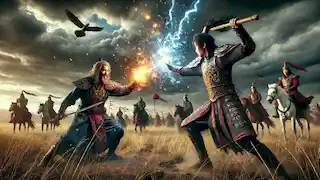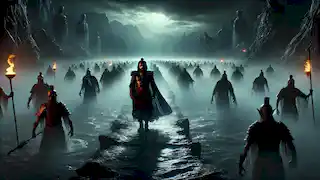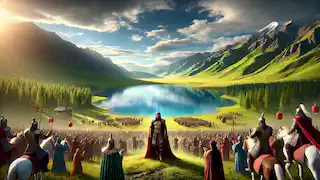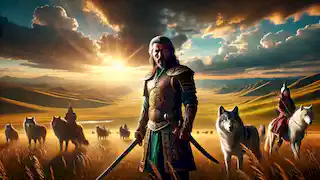In the boundless steppes of ancient Mongolia, where the earth meets the sky in an endless horizon, and the winds carry the whispers of spirits long forgotten, there arose a legend—King Gesar. This is not merely a tale of one man's life but a saga that encompasses the struggles, victories, and the very soul of a people. The Epic of King Gesar is a tapestry woven with the threads of bravery, wisdom, love, and sacrifice, echoing through the ages as a testament to the spirit of Mongolia. King Gesar’s origins are shrouded in divine mystery. It is said that his father was Khormusta Tengri, the god of the heavens, who looked down upon the earth and saw the suffering of the people. The tribes of Mongolia were fractured, locked in endless battles over land, pride, and power. The once-great nation was in disarray, and the gods knew that only a being of divine origin could unite the people and bring peace to the land. Khormusta Tengri descended to earth in the guise of a falcon and sought out the most virtuous woman in the land, a mortal princess named Gojohma, who was known for her beauty and wisdom. The union of Khormusta Tengri and Gojohma brought forth a child, a boy destined to be a hero. His birth was heralded by the elements themselves; the skies roared with thunder, and the earth trembled, acknowledging the arrival of a great leader. From the moment of his birth, it was clear that Gesar was no ordinary child. He had a strength that belied his small frame, and his eyes shone with an intelligence far beyond his years. Shamans from across the steppes came to see the child, each of them confirming the prophecy—this boy would be the one to unite the tribes and bring peace to the land. Yet, his path to greatness was fraught with peril from the very beginning. Not everyone was pleased with the arrival of this divine child. Gesar's uncle, Senglon, a man consumed by ambition and jealousy, saw the boy as a threat to his own power. Senglon, who had seized control of the tribe through deceit and treachery, could not tolerate the thought of being overshadowed by a mere child, even one born of the gods. He conspired to eliminate Gesar before the boy could grow strong enough to challenge him. Using his silver tongue, Senglon persuaded Gojohma, who was still recovering from childbirth, that the child was cursed. He convinced her to abandon the boy in the wilderness, where he would surely perish. With a heavy heart, Gojohma complied, leaving her son in the barren steppe, alone and vulnerable. But the forces of nature, recognizing the boy's divine lineage, did not forsake him. The wolves of the steppe, often feared by man, became his protectors. They nurtured him, fed him, and taught him the ways of the wild. Gesar grew among the wolves, learning their language, understanding the rhythms of nature, and developing the instincts of a warrior. He also received guidance from mystical beings—spirits of the earth, wind, and water—who imparted to him the knowledge he would need to fulfill his destiny. As Gesar grew into manhood, he became a figure of legend. The tribes spoke in hushed tones of the wild child who had tamed the wolves and could speak to the spirits. Tales of his strength, wisdom, and courage spread far and wide, and soon, even Senglon could not ignore the growing power of his nephew. The day came when Gesar, now a formidable warrior, returned from the wilderness. He did not come seeking revenge, but justice. He confronted Senglon in front of the entire tribe, challenging his uncle's rule. Senglon, though older, was still a cunning and ruthless leader. He accepted the challenge, confident that he could defeat the boy and solidify his power once and for all. The battle that ensued was nothing short of epic. Senglon, relying on dark magic and years of experience, fought with all his might. But Gesar, fueled by the strength of the gods and the wisdom of the spirits, proved to be an unstoppable force. The earth shook with their clash, and the sky darkened as if nature itself was watching with bated breath. In the end, it was Gesar who emerged victorious. He did not kill his uncle, as many had expected, but instead showed mercy. He banished Senglon to the farthest reaches of the steppes, a place where he could no longer harm others. Senglon, broken and defeated, disappeared into the wilderness, never to be seen again. With Senglon's downfall, the tribes looked to Gesar as their leader. They crowned him King, and for the first time in many years, the people of Mongolia knew peace. But peace was not a guarantee; it was something that had to be fought for, as Gesar would soon discover. As King, Gesar faced numerous challenges. Though the tribes were united, external threats loomed large. Warlords from distant lands, envious of Mongolia's newfound strength and unity, sought to invade and conquer. Among these threats was the fearsome demon king, Lutsan Khan, whose name struck terror into the hearts of even the bravest warriors. Lutsan Khan was not a mere man but a creature of darkness, born of the night and wielding powers beyond mortal comprehension. His army was vast, composed of both men and monsters, and he harbored a deep hatred for all that was good in the world. Lutsan Khan saw in Mongolia a land ripe for conquest, and he unleashed his forces upon the kingdom with ruthless efficiency. King Gesar, however, was not one to shy away from battle. Mounted on his legendary horse, Khyar Sogd, a steed as swift as the wind and as strong as iron, Gesar led his army into battle against Lutsan Khan. The clash between their forces was titanic, with the very earth scorched by the ferocity of their conflict. Gesar wielded his enchanted sword, a gift from the gods, which could cut through anything, even the fabric of reality itself. The battle against Lutsan Khan raged for days, each side suffering tremendous losses. But Gesar’s unwavering determination, coupled with his strategic brilliance, turned the tide. He engaged Lutsan Khan in single combat, a fight that shook the heavens. Lutsan Khan unleashed all his dark powers, but Gesar, with the strength of the gods flowing through him, struck the demon king down, shattering his dark heart and banishing his soul to the abyss. With Lutsan Khan defeated, the people of Mongolia rejoiced. But Gesar knew that his battles were far from over. The shamans of the land warned him of a prophecy that spoke of a great evil that would rise again, an evil that could only be kept at bay by securing the three precious stones of the earth. The shamans told Gesar that these stones were hidden in the most dangerous places on earth, guarded by creatures of immense power and cunning. The stones were said to hold the balance of the world’s power, and if they fell into the wrong hands, it could mean the end of all that was good and just. Gesar knew that he could not ignore this quest. He gathered his most trusted warriors and set out on a journey that would take him to the ends of the earth. The first stone was hidden in the Gobi Desert, a vast and unforgiving expanse of sand and rock. The stone was guarded by the spirit of the sand, a colossal creature that could command the very desert itself. The journey through the Gobi was arduous. The heat was unbearable, and the sandstorms were relentless. But Gesar and his warriors pressed on, driven by their determination to protect their homeland. When they finally reached the heart of the desert, they found the spirit of the sand waiting for them. The creature was massive, its body made entirely of shifting sand, and it could change shape at will, making it nearly impossible to fight. Gesar, however, understood that brute strength alone would not win this battle. He challenged the spirit to a game of riddles, knowing that the creature, bound by ancient laws, could not refuse. For three days and nights, they traded riddles, each more difficult than the last. Finally, Gesar posed a riddle so intricate that the spirit, for all its wisdom, could not solve it. Defeated by its own rules, the spirit surrendered the first stone to Gesar, who took it and secured it in a sacred pouch. The second stone was hidden in the icy peaks of the Altai Mountains, a place so cold that even the bravest warriors hesitated to venture there. The stone was guarded by a dragon, a creature as old as the mountains themselves, with scales that glimmered like ice and a breath that could freeze the air. The climb to the dragon's lair was perilous. The winds howled like banshees, and the cold was so intense that it could freeze a man’s blood in his veins. But Gesar, undeterred, led his warriors up the treacherous slopes. When they finally reached the dragon's lair, they found the creature coiled around the stone, its eyes glowing with a malevolent light. The battle with the dragon was one of the most difficult of Gesar’s life. The creature’s breath froze everything it touched, and its scales were impervious to most weapons. But Gesar, using his enchanted sword and the lessons he had learned from the spirits, managed to outmaneuver the beast. He struck a blow so precise that it shattered the dragon's scales at their weakest point, and with a final, mighty thrust, he drove his sword into the dragon’s heart. As the dragon's body dissolved into mist, it left behind the second stone, which Gesar carefully placed alongside the first. The third and final stone was the most elusive, for it was hidden in the underworld itself. To retrieve it, Gesar would have to cross the river of souls, a journey that no living man had ever survived. The underworld was a place of shadows and echoes, where the spirits of the dead wandered, waiting for their chance to return to the world of the living. Gesar, guided by the shamans and driven by his unwavering sense of duty, made the perilous descent into the underworld. The journey across the river of souls was harrowing, with the spirits of the dead trying to pull him into the depths. But Gesar, with his iron will and the strength of his divine lineage, resisted their pull. He called upon the spirits of his ancestors, who appeared to guide him through the darkness. At the heart of the underworld, Gesar found the third stone, guarded by the spirits of those he had slain in battle. These spirits, filled with anger and a desire for revenge, confronted Gesar, demanding retribution. But Gesar, ever wise, reminded them that he had fought for justice, for the protection of his people, and not for personal gain. His words, filled with truth and sincerity, calmed the spirits, who allowed him to take the stone and return to the world of the living. With the three precious stones in his possession, King Gesar returned to his kingdom. The people, who had anxiously awaited his return, welcomed him as a hero. But Gesar knew that the power of the stones was both a blessing and a curse. If they remained in one place, they could become a source of great evil. Therefore, Gesar decided to return the stones to the earth, hiding them in places where only the worthy could find them. He journeyed to the ends of his kingdom, placing the first stone deep within the heart of a sacred mountain, where only the purest of heart could reach it. The second stone was placed beneath the roots of an ancient tree, a tree that was said to hold the wisdom of the ages. The third stone, the most powerful of all, was hidden in the depths of a crystal-clear lake, where only those who could see beyond the surface would find it. With the stones hidden and the balance of the world restored, Gesar's task was complete. He had fulfilled his destiny, bringing peace and prosperity to his people. His kingdom thrived, and the people lived in harmony, free from the fear of war and tyranny. But even as he ruled, Gesar felt a growing restlessness. The shamans spoke of a time when he would be needed again, when the forces of darkness would rise once more. And so, one night, without warning, Gesar rode out into the wilderness, disappearing into the mist. His people searched for him, but he was never found. Some say that he ascended to the heavens, where he watches over the world, waiting for the day when he will be called upon once more. Though King Gesar vanished from the mortal world, his legend lived on. The stories of his deeds were told and retold by the fireside, passed down from generation to generation. His name became synonymous with heroism, justice, and wisdom. The kingdom he built endured, its people remembering the lessons he had taught them. The shamans say that King Gesar did not die but ascended to the heavens, where he watches over the world, waiting for the time when he will be called upon once more. They say that when the world is in its darkest hour, when the forces of evil threaten to overwhelm the light, King Gesar will return, riding from the mountains with his sword in hand, ready to lead his people to victory once more. Until that day comes, the people of Mongolia keep his memory alive, honoring the hero who brought them peace and prosperity. The epic of King Gesar is more than just a story; it is a beacon of hope, a reminder that no matter how dark the times may seem, there is always a hero ready to rise, to fight for what is right, and to bring light to the world. The story of King Gesar is not just the tale of one man’s life but the very essence of Mongolia's spirit. It is a saga that has been passed down through the ages, a living part of the culture and identity of the Mongolian people. In the vast, untamed wilderness of the steppes, where the wind whispers the secrets of the past, the legend of King Gesar continues to inspire, a timeless reminder of the power of courage, wisdom, and justice. And so, the tale of King Gesar continues, not just as a legend of the past but as a living part of the culture and spirit of Mongolia, a story that will be told for generations to come. Each telling of the story adds another layer to the legend, ensuring that the epic of King Gesar will never be forgotten, but will live on in the hearts and minds of the Mongolian people for all eternity.The Heavenly Birth of King Gesar
The Jealousy of Senglon
The Young Warrior’s Return

The Trials of King Gesar
The Quest for the Three Precious Stones

The Restoration of Balance

The Eternal Legacy of King Gesar


The Epic of King Gesar
Reading Time: 13 min

About Story: The Epic of King Gesar is a Legend Stories from mongolia set in the Ancient Stories. This Dramatic Stories tale explores themes of Courage Stories and is suitable for All Ages Stories. It offers Cultural Stories insights. A legendary saga of divine heroism and epic quests in ancient Mongolia.
















